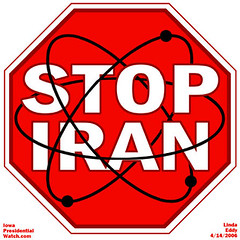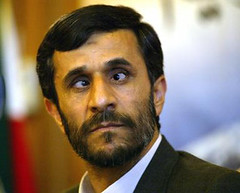Saturday, July 07, 2007
Sen. LIEBERMAN ON IRAN
Iran's Proxy War
Joseph Lieberman - Jul 06, 2007 The Wall Street Journal
Earlier this week, the U.S. military made public new and disturbing information about the proxy war that Iran is waging against American soldiers and our allies in Iraq.According to Brig. Gen. Kevin Bergner, the U.S. military spokesman in Baghdad, the Iranian government has been using the Lebanese terrorist group Hezbollah to train and organize Iraqi extremists, who are responsible in turn for the murder of American service members.
Gen. Bergner also revealed that the Quds Force--a special unit of the Iranian Revolutionary Guard Corps whose mission is to finance, arm and equip foreign Islamist terrorist movements--has taken groups of up to 60 Iraqi insurgents at a time and brought them to three camps near Tehran, where they have received instruction in the use of mortars, rockets, improvised explosive devices and other deadly tools of guerrilla warfare that they use against our troops.
Iran has also funded its Iraqi proxies generously, to the tune of $3 million a month.
Based on the interrogation of captured extremist leaders--including a 24-year veteran of Hezbollah, apparently dispatched to Iraq by his patrons in Tehran--Gen. Bergner also reported on Monday that the U.S. military has concluded that "the senior leadership" in Iran is aware of these terrorist activities. He said it is "hard to imagine" Ayatollah Ali Khamenei--Iran's supreme leader--does not know of them.
These latest revelations should be a painful wakeup call to the American people, and to the U.S. Congress. They also expand on a steady stream of public statements over the past six months by David Petraeus, the commanding general of our coalition in Iraq, as well as other senior American military and civilian officials about Iran's hostile and violent role in Iraq.
In February, for instance, the U.S. military stated that forensic evidence has implicated Iran in the death of at least 170 U.S. soldiers. Iran's actions in Iraq fit a larger pattern of expansionist, extremist behavior across the Middle East today. In addition to sponsoring insurgents in Iraq,
Tehran is training, funding and equipping radical Islamist groups in Lebanon, Palestine and Afghanistan--where the Taliban now appear to be receiving Iranian help in their war against the government of President Hamid Karzai and its NATO defenders.
While some will no doubt claim that Iran is only attacking U.S. soldiers in Iraq because they are deployed there--and that the solution, therefore, is to withdraw them--Iran's parallel proxy attacks against moderate Palestinians, Afghans and Lebanese directly rebut such claims.
Iran is acting aggressively and consistently to undermine moderate regimes in the Middle East, establish itself as the dominant regional power and reshape the region in its own ideological image. The involvement of Hezbollah in Iraq, just revealed by Gen. Bergner, illustrates precisely how interconnected are the different threats and challenges we face in the region.
The fanatical government of Iran is the common denominator that links them together.
No responsible leader in Washington desires conflict with Iran. But every leader has a responsibility to acknowledge the evidence that the U.S. military has now put before us: The Iranian government, by its actions, has all but declared war on us and our allies in the Middle East.
America now has a solemn responsibility to utilize the instruments of our national power to convince Tehran to change its behavior, including the immediate cessation of its training and equipping extremists who are killing our troops.
Most of this work must be done by our diplomats, military and intelligence operatives in the field. But Iran's increasingly brazen behavior also presents a test of our political leadership here at home.
When Congress reconvenes next week, all of us who are privileged to serve there should set aside whatever partisan or ideological differences divide us to send a clear, strong and unified message to Tehran that it must stop everything it is doing to bring about the death of American service members in Iraq.
It is of course everyone's hope that diplomacy alone can achieve this goal. Iran's activities inside Iraq were the central issue raised by the U.S. ambassador to Iraq in his historic meeting with Iranian representatives in Baghdad this May. However, as Gen. Bergner said on Monday, "There does not seem to be any follow-through on the commitments that Iran has made to work with Iraq in addressing the destabilizing security issues here."
The fact is, any diplomacy with Iran is more likely to be effective if it is backed by a credible threat of force--credible in the dual sense that we mean it, and the Iranians believe it.
Our objective here is deterrence. The fanatical regime in Tehran has concluded that it can use proxies to strike at us and our friends in Iraq, Afghanistan, Lebanon and Palestine without fear of retaliation. It is time to restore that fear, and to inject greater doubt into the decision-making of Iranian leaders about the risks they are now running.
I hope the new revelations about Iran's behavior will also temper the enthusiasm of some of those in Congress who are advocating the immediate withdrawal of U.S. forces from Iraq. Iran's purpose in sponsoring attacks on American soldiers, after all, is clear: It hopes to push the U.S. out of Iraq and Afghanistan, so that its proxies can then dominate these states.
Tehran knows that an American retreat under fire would send an unmistakable message throughout the region that Iran is on the rise and America is on the run.
That would be a disaster for the region and the U.S.
The threat posed by Iran to our soldiers' lives, our security as a nation and our allies in the Middle East is a truth that cannot be wished or waved away. It must be confronted head-on. The regime in Iran is betting that our political disunity in Washington will constrain us in responding to its attacks. For the sake of our nation's security, we must unite and prove them wrong.
FOOTNOTE from other source
Iran on Wednesday denounced as "false and ridiculous claims" new US accusations that a Lebanese Hizbullah special operations chief arrested in Iraq was working against US troops on behalf of Iran's elite Qods Force.
Ali Musa Daqduq was arrested in March with two Iraqi brothers, who US officers claimed on Monday were training small cells of "militia extremists" as a "proxy" for Iran's Revolutionary Guards Corps (IRGC) in Iraq.
Analysts are debating the significance of the arrests, what they indicate about Iranian-Hizbullah ties and their scale in Iraq, and their impact on the broader US-Iran confrontation.
"We're really talking about [Hizbullah] instructors, tacticians, and technical experts who are able, with the Iranians, to work hand in hand [with Iraqis]," says Magnus Ranstorp, an expert at the Center for Asymmetric Threat Studies at the Swedish National Defense College in Stockholm.
"This sort of technical expertise rests with half the key in Beirut and half the key in Iran," says Mr. Ranstorp, noting a "very small" Hizbullah presence in Iraq since 2003.
Subscribe to:
Post Comments (Atom)














2 comments:
Keep drinking the Kool-Aid. Obviously you didn't learn that the Cheney Administration lied about the reason to invade Iraq. Now you're buying all the lies about why we should invade Iran. Leave Iran alone and they'll leave us alone. Doesn't seem to bother you that Saudi Arabia treats its people like slaves and 15 of the 19 9/11 hijackers were from there as long as Cheney says they're OK.
Wake up and think for yourself.
The Tehran Theocracy of Turds must be confronted decisively and head-on as soon as possible.
Tomorrow is too late.
Post a Comment